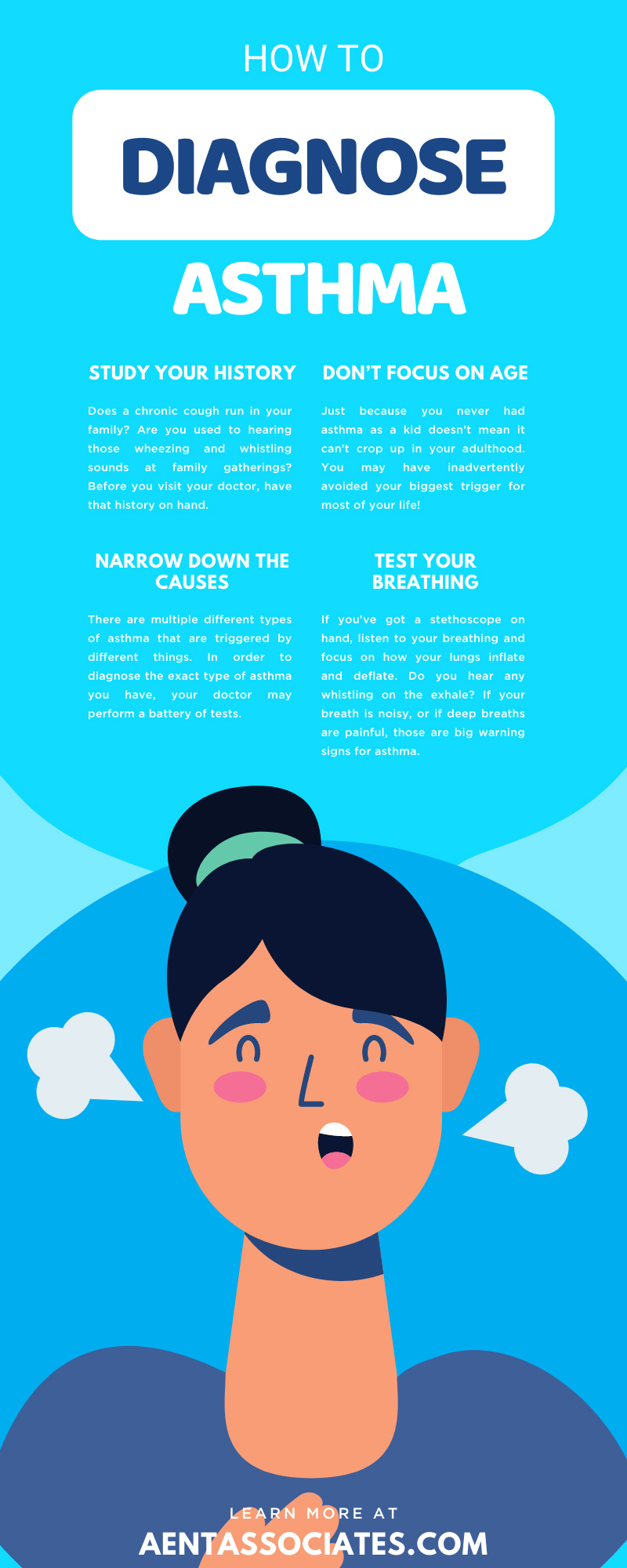When you find yourself wheezing at any physical exertion, or when you hear a faint whistle in your breath, asthma could be the culprit. In order to get to the bottom of your respiratory woes, a visit to an allergy and asthma specialist near you is in order. Allergy & ENT Associates is here to help you get your breathing back on track; here’s a guide on how to diagnose asthma.
Study Your History
Does a chronic cough run in your family? Are you used to hearing those wheezing and whistling sounds at family gatherings? Before you visit your doctor, have that history on hand. In addition, take an inventory of your other health concerns. If you have allergies or have battled sinus conditions in the past, those both increase your risk of asthma. If you smoke, or if you are in regular contact with somebody who does, let your doctor know that, too. Cigarette smoke is a common asthma trigger, as is pollen. If you like to garden or frequently work outside, you may be in everyday contact with a whole host of allergens. Take note of your personal and medical history before you go in to see your doctor; they’ll need to know as much as possible!
Test Your Breathing
If you’ve got a stethoscope on hand, listen to your breathing and focus on how your lungs inflate and deflate. Do you hear any whistling on the exhale? If your breath is noisy, or if deep breaths are painful, those are big warning signs for asthma. See your doctor right away; they may want to run more tests for themselves, like a lung capacity test or X-rays of the chest and sinuses.
One of the most common tests for asthma is called the spirometry test. A spirometer is a device that measures lung capacity and function. You’ll be asked to blow air as hard and as fast as you can into a tube connected to the spirometer. The results will tell your doctor how much air you can inhale and exhale, as well as how fast you can do so. These metrics are invaluable to your doctor as they confirm whether you have asthma.
Your doctor may also set a few challenges before you to see how your body reacts. An irritant challenge is just what it sounds like: the doctor exposes you to an allergen like pollen or perfume, then has you do the spirometry test again. They may also set an exercise challenge before you; heavy physical exertion is a common trigger for painful, asthmatic breathing.
Narrow Down the Causes
There are multiple different types of asthma that are triggered by different things. In order to diagnose the exact type of asthma you have, your doctor may perform a battery of tests.
Allergy tests are common whether or not you complain of asthma symptoms. However, pollen, smoke, perfume, and pet dander are all common culprits for wheezing and obstructed airways. If your allergies go hand-in-hand with your asthma, your doctor can prescribe medication that soothes your allergic symptoms to keep the asthmatic symptoms at bay.
Asthma can also pop up alongside chronic obstructive pulmonary disease (commonly known as COPD). COPD encompasses a variety of lung ailments like emphysema, chronic bronchitis, and severe asthma. Asthma and COPD are two separate diseases but they can often appear together. Smoking and secondhand smoke inhalation are the most common culprits for COPD, and they inevitably make asthma much worse.
Exercise-induced bronchoconstriction (EIB) used to be called exercise-induced asthma. Many people have both conditions and there are medications that can treat both, though they are slightly different ailments. It is not necessarily a symptom of being “out of shape”—many world-class athletes have EIB and use medication and lifestyle alterations to treat it.
Occupational asthma is often found in people who work in allergen-heavy environments. If you work with animals regularly, or if your job keeps you outdoors (perhaps in gardening or landscaping), your workplace may be making you sick. Using an inhaler or other asthma medications right before you go to work can ease your symptoms.
Don’t Focus On Age
Just because you never had asthma as a kid doesn’t mean it can’t crop up in your adulthood. You may have inadvertently avoided your biggest trigger for most of your life! If you grew up in an environment full of fresh, filtered, perfume-free air, you may exhibit symptoms after moving to a big city. If you steered clear of cigarettes your whole life but then end up living with a smoker, you may hear yourself beginning to wheeze. Adult-onset asthma is not to be ignored.
Similarly, if you have a little one in the house who’s beginning to cough like a smoker, take them to an asthma specialist near you. They are never too young to receive asthma treatment, just as you are never too old.
Advocate for Yourself
Sometimes asthma isn’t caused by any obvious triggers like allergens or exercise; sometimes it just happens! If you are experiencing shortness of breath, tightness in your chest, and that signature wheeze, talk to your doctor no matter what. Work with the specialists at Allergy & ENT Associates; an allergist can help you rule out various triggers and get closer to a diagnosis. Even if it isn’t asthma, you and your doctor need to know what is causing your symptoms.
In the quest to find answers, you may discover that you don’t have asthma at all. If that is the case, your respiratory woes could be symptoms of another condition. Keep in contact with your doctor on your journey to that diagnosis, whatever it may be. Getting that diagnosis is another step closer to finding treatment that will keep your symptoms under control and get you on the road to better health.
You may not know how to diagnose asthma all on your own, but now you’ve got a clearer picture of the road to diagnosis. With this knowledge, you’ll be an active and informed participant in your own testing, and you’ll better be able to advocate for yourself. Call an asthma specialist near you—Allergy & ENT Associates is dedicated to helping you clear your airways and enjoy life without a whistle in your breath.



